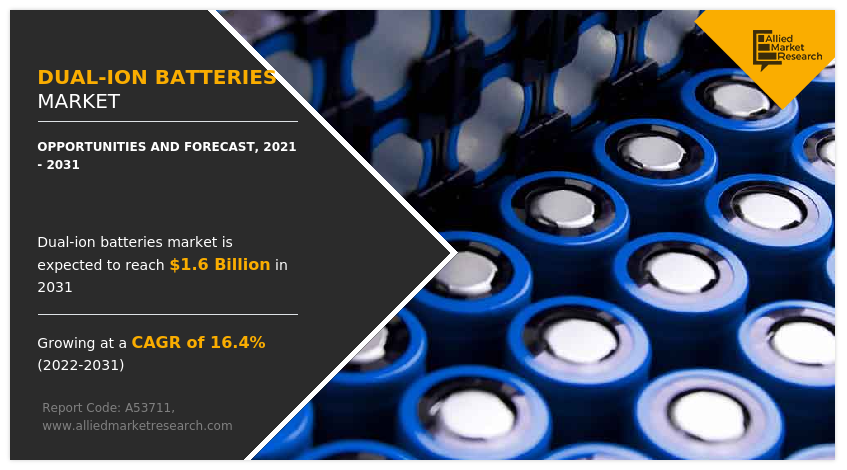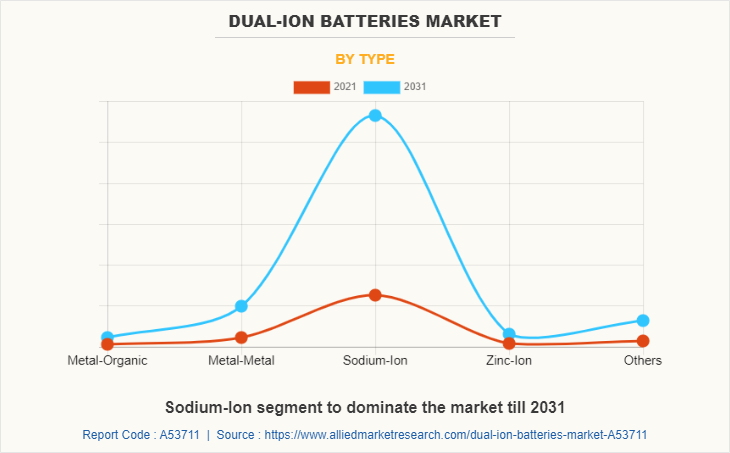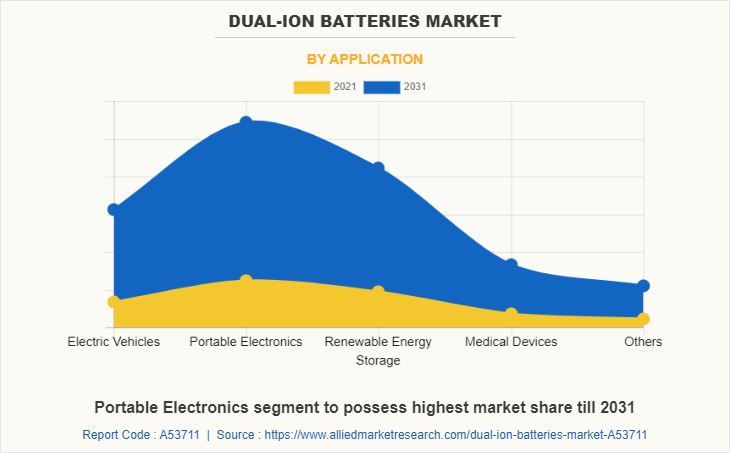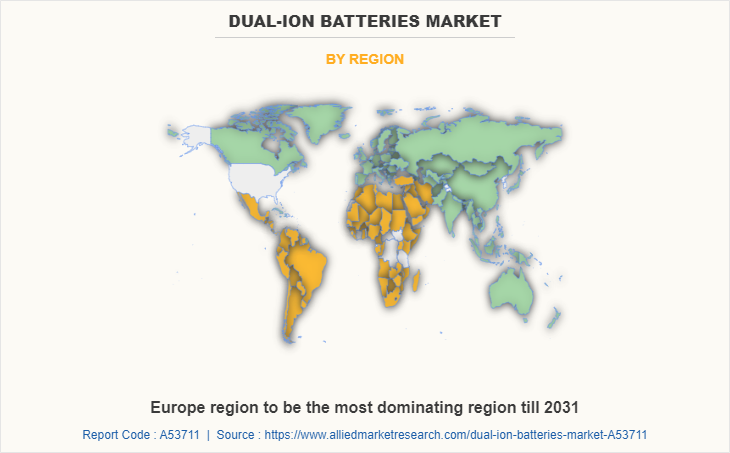Dual-ion Batteries Market Research, 2031
The global dual-ion batteries market size was valued at $0.3 billion in 2021, and dual-ion batteries industry is projected to reach $1.6 billion by 2031, growing at a CAGR of 16.4% from 2022 to 2031.

Dual-ion batteries are a type of rechargeable battery that utilizes two different types of ions, typically metal cations and organic anions, to store and release energy. This technology has gained increasing attention in recent years due to its potential advantages over conventional lithium-ion batteries, including higher energy density, longer cycle life, and improved safety. As the demand for efficient and sustainable energy storage solutions increases, dual-ion batteries have emerged as a promising technology in various applications.
The global dual-ion batteries market is driven by the increasing demand for electric vehicles, portable electronics, and renewable energy storage. Dual-ion batteries have shown significant potential in these applications due to their high energy density and long cycle life. Additionally, the low cost and abundance of raw materials make them an attractive alternative to other emerging battery technologies. However, the market growth may be restrained by factors such as high manufacturing costs, limited availability of raw materials, and the lack of standardization.
Growing Potential of Dual-Ion Batteries for Electric Vehicles
Electric vehicles (EVs) have been growing in popularity over the past few years as people look for greener alternatives to traditional gasoline-powered cars. However, one of the biggest challenges in the EV industry has been the development of efficient and reliable batteries. Dual-ion batteries have emerged as a potential solution.
Dual-ion batteries differ from traditional lithium-ion batteries in that they use two different types of ions (usually lithium and an anode such as aluminum or graphite) instead of just one. This allows for increased energy density and faster charging times.
The potential benefits of dual-ion batteries for EVs are significant. They can provide longer driving ranges, shorter charging times, and reduced weight compared to traditional lithium-ion batteries. Additionally, they can be more cost-effective and environmentally friendly as they use less rare and expensive metals.
While there are still challenges to be overcome in the development and commercialization of dual-ion batteries, their potential for improving EV technology is clear. As the demand for sustainable transportation continues to grow, the exploration and development of new battery technologies will be crucial in ensuring a greener future.
Dual-Ion Batteries: A Promising Solution for High-Performance Portable Electronics
Dual-ion batteries are emerging as a promising solution for high-performance portable electronics. These batteries use two different types of ions, typically sodium and magnesium, to store and release energy, which enables them to offer high energy density, fast charging times, and potentially lower costs. The use of dual-ion batteries in portable electronics has several advantages. For instance, smartphones and laptops can be charged faster, and their battery life can be significantly improved. This can be particularly useful for people who rely on their devices for work, entertainment, or communication.
Furthermore, dual-ion batteries offer a safer alternative to traditional lithium-ion batteries. The use of sodium and magnesium in dual-ion batteries makes them less prone to overheating and fire accidents. This feature is particularly crucial for devices that are frequently exposed to extreme temperatures, such as laptops and smartphones.
Companies such as Xiaomi and Panasonic have already started incorporating dual-ion batteries into their products. Xiaomi's Mi 10 smartphone, for example, is equipped with a 4,780mAh dual-ion battery, which offers a fast-charging time of 30 minutes. Overall, dual-ion batteries hold great promise for the future of portable electronics, offering high-performance and safe energy storage solutions.
Direct and indirect factors influencing the global dual-Ion batteries market growth are,
- Green Energy Initiatives
Dual-ion batteries have the potential to make a significant positive impact on green energy initiatives, by providing a reliable, efficient, and sustainable energy storage solution. As technology continues to develop, it will be important to address the challenges and limitations associated with dual-ion batteries, to unlock their full potential for a more sustainable and low-carbon future.
- Battery Recycling
Dual-ion batteries have the potential to make a positive impact on battery recycling by extending the lifespan of batteries, reducing the use of toxic materials, and reducing the overall demand for batteries. As consumers move towards a more sustainable and circular economy, it is essential to prioritize the development of efficient and sustainable battery technologies that promote responsible and ethical practices throughout the battery industry.
- New Innovations in Battery Industry
Dual-ion batteries are already having a significant impact on new innovations in battery technology. Their unique properties have contributed to the development of new battery technologies, such as solid-state batteries and flow batteries, and are driving innovation in the materials science field. As research into dual-ion batteries and other advanced battery technologies continues, it is likely that there will be even more significant advancements in battery technology in the years to come.
The global dual-ion batteries market forecast is segmented into type, application, and region. Based on type, the market is divided into metal-organic, metal-metal, sodium-ion, zinc-ion, and others. By application, it is divided into electric vehicles, portable electronics, renewable energy storage, medical devices, and others. By region, the market is studied across North America, Europe, Asia-Pacific, and LAMEA.

By type, it is divided into metal-organic, metal-metal, sodium-ion, zinc-ion, and others. The sodium-ion segment accounted for the largest dual-ion batteries market share in 2021. This growth in demand can be attributed to the presence of demand for sodium-ion batteries in the renewable energy industry, portable electronics, and automotive industry for energy storage.

By application, it is divided into electric vehicles. portable electronics, renewable energy, medical devices, and others. The portable electronics segment accounted for the largest revenue share in the global dual-ion batteries market in 2021. The key trend driving the growth of dual-ion batteries in the portable electronics market is the increasing demand for devices with longer battery life and faster charging times. Dual-ion batteries can offer higher energy densities and faster charging times than lithium-ion batteries, enabling longer use times for portable devices and reducing downtime for charging.

Region-wise, Europe accounted for the largest market share in the market and is projected to grow at a CAGR of 16.1% during the forecast period. In Europe, the market for DIBs is still in its early stages, but there are several key market trends and opportunities that indicate significant potential for growth. One of the biggest market trends driving the growth of DIBs in Europe is the increasing demand for energy storage solutions that can support renewable energy sources such as solar and wind.
Russia and Ukraine War- Complex and Multifaceted Impact on Dual-Ion Batteries Industry in Europe
The impact of dual-ion batteries on the Russia-Ukraine war is not straightforward, as it depends on various factors such as supply chain disruptions, international relations, and political instability. While the conflict may potentially impact the production and availability of dual-ion batteries, the increased adoption of these batteries could also contribute to a more sustainable and resilient energy system. Ultimately, it is important to prioritize ethical and sustainable practices throughout the battery industry and to promote peace and stability in regions affected by conflicts.
IMPACT OF COVID-19 ON THE GLOBAL DUAL-ION BATTERIES MARKET
The pandemic caused disruptions in supply chains and manufacturing processes, which affected the production of dual-ion batteries. The restrictions and regulations imposed by governments to control the spread of the virus also led to a decline in investment and research and development activities in the sector.
However, as the pandemic progressed, the demand for electric vehicles increased as people looked for sustainable and environmentally friendly options for transportation. The rise in demand for EVs positively impacted the dual-ion batteries market, leading to an increase in production and sales.
The pandemic also led to an increased focus on the importance of battery technology for renewable energy storage, which has driven investment and research into improving the efficiency and sustainability of dual-ion batteries.
Post-pandemic, the global dual-ion batteries market is projected to grow at a significant rate in the coming years, with increasing demand for electric vehicles and the need for efficient energy storage solutions. The pandemic may have caused disruptions in the short term, but it has also highlighted the importance of developing resilient and sustainable technologies to address global challenges.
Competitive Landscape
Key players in the dual-ion batteries industry are Faradion Limited, Tiamat Energy, Prieto Battery, Excellatron, Ionic Materials, Solid Energy Systems, Qing Tao Energy Development Co., Ltd., Sion Power, Custom cells Itzehoe GmbH, and Jenax. These players have adopted investment strategies in research and development to commercialize dual-ion batteries in the market.
Key Benefits For Stakeholders
- This report provides a quantitative analysis of the market segments, current trends, estimations, and dynamics of the dual-ion batteries market analysis from 2021 to 2031 to identify the prevailing dual-ion batteries market opportunities.
- The market research is offered along with information related to key drivers, restraints, and opportunities.
- Porter's five forces analysis highlights the potency of buyers and suppliers to enable stakeholders make profit-oriented business decisions and strengthen their supplier-buyer network.
- In-depth analysis of the dual-ion batteries market segmentation assists to determine the prevailing market opportunities.
- Major countries in each region are mapped according to their revenue contribution to the global market.
- Market player positioning facilitates benchmarking and provides a clear understanding of the present position of the market players.
- The report includes the analysis of the regional as well as global dual-ion batteries market trends, key players, market segments, application areas, and market growth strategies.
Dual-ion batteries Market Report Highlights
| Aspects | Details |
| Market Size By 2031 | USD 1.6 billion |
| Growth Rate | CAGR of 16.4% |
| Forecast period | 2021 - 2031 |
| Report Pages | 256 |
| By Type |
|
| By Application |
|
| By Region |
|
| Key Market Players | Tiamat Energy, Solid Energy Systems, Prieto Battery, Qing Tao Energy Development Co., Ltd., Sion Power, Faradion Limited, Ionic Materials, Custom Cells Itzehoe GmbH, Jenax, Excellatron |
Analyst Review
As per the CXO Perspective, the dual-ion batteries market reveals significant growth potential in the coming years, driven by the increasing demand for high-performance energy storage solutions. Dual-ion batteries have been gaining significant attention in the battery industry as a potential alternative to conventional lithium-ion batteries. This technology is based on the use of two different types of ions, usually metal cations and organic anions, to store and release energy. This unique design provides dual-ion batteries with several advantages over traditional batteries, including higher energy density, longer lifespan, and improved safety.
The dual-ion batteries market is segmented by type into metal-organic, metal-metal, sodium-ion, zinc-ion, and others (aluminum-ion, magnesium-ion). Among these, metal-organic dual-ion batteries are expected to dominate the market due to their high energy density and long cycle life. The metal-metal type is also gaining traction due to its high theoretical capacity and fast charging capability. The sodium-ion and zinc-ion batteries are expected to witness significant growth due to their low cost and abundant availability of raw materials.
Based on application, the dual-ion batteries market is segmented into electric vehicles, portable electronics, renewable energy storage, medical devices, and others (aerospace, and power utilities). The portable electronics segment is expected to be the largest market due to the increasing adoption of wearable devices and smartphones. Dual-ion batteries offer improved safety and longer lifespan, making them an ideal choice for these applications. The renewable energy storage segment is expected to witness significant growth due to the increasing adoption of solar and wind energy. Dual-ion batteries offer high energy density and low cost, making them an attractive option for energy storage applications.
Geographically, Asia Pacific is expected to possess highest market growth for the dual-ion batteries market due to the presence of major manufacturers in countries such as China, Japan, and South Korea. Furthermore, the region's growing automotive industry and increasing investments in renewable energy are expected to drive the demand for dual-ion batteries in the region.
Dual-ion batteries have a higher energy density compared to conventional lithium-ion batteries and growth in awareness related to environmental sustainability are the key factors boosting the Dual-ion batteries market growth.
The market value of Dual-ion batteries in 2031 is expected to be $1.6 billion
Faradion Limited, Tiamat Energy, Prieto Battery, Excellatron, Ionic Materials, Solid Energy Systems, Qing Tao Energy Development Co., Ltd., Sion Power, Custom cells Itzehoe GmbH, and Jenax
Portable electronics application is projected to increase the demand for Dual-ion batteries Market
The global dual-ion batteries market analysis is segmented into type, application, and region. Based on type, the market is divided into metal-organic, metal-metal, sodium-ion, zinc-ion, and others. By application, it is divided into electric vehicles, portable electronics, renewable energy storage, medical devices, and others. By region, the market is studied across North America, Europe, Asia-Pacific, and LAMEA.
Growth in demand for energy storage is the Main Driver of Dual-ion batteries Market.
Dual-ion batteries have the potential to make a significant positive impact on green energy initiatives, by providing a reliable, efficient, and sustainable energy storage solution. As the technology continues to develop, it will be important to address the challenges and limitations associated with dual-ion batteries, in order to unlock their full potential for a more sustainable and low-carbon future.
Loading Table Of Content...
Loading Research Methodology...



